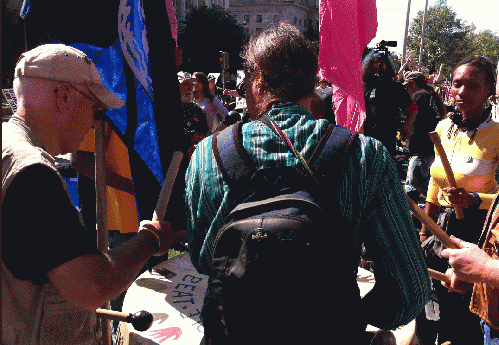Most millennial activism right now focuses on accomplishing specific political goals, but several recent and important works suggest that it must also focus on building activist community. These goals operate in parallel but they are not identical. In Direct Action: protest and the Reinvention of American Radicalism (2017) L. A. Kauffman reviews the history of activism like that embraced today by organizations such as Indivisible, Black Lives Matter, Our Revolution, The Women's March, etc.. She documents how some flared brilliantly for a time, but all died out. Some were acutely aware of the need to build-in staying power, to create sufficient connection among movement members to withstand assaults, but none did this successfully enough. Now would seem the time for activists to focus on how to avoid this outcome for current movements, since more is at stake than ever before.
Alex Pentland, in Social Physics: how social networks can make us smarter (2014), offers empirical evidence that information gained from many fellow citizens, most of them strangers, improves one's decision making about such things as stock purchases, voting, and other practical issues, even when engagement with them is not face to face. But if the goal is to cement commitment to community-supportive behavior, face-to-face engagement he finds to be essential. For activist organizers this would suggest creating a large community of sophisticated issues-knowledgeable people using Pentland's approach, in hopes that many might commit to facilitating the additional creation of large scale face-to-face engagement.
Becky Bond and Zack Eckley in Rules for Revolutionaries: how big organizing can change everything (2018) report how they intuitively applied just such an approach in the process of building a huge volunteer network in support of Bernie Sander's presidential candidacy. Through digital engagement they recruited competent volunteers and garnered a wealth of good ideas for maximizing phone banks and get-out-the vote actions, that became refined and improved through further digital engagement. But it was through face-to-face, what they called Barnstorming engagement, that the commitments of key volunteers were solidified. Solidified to such a degree that to Bond's and Eckley's great surprise, little professional supervision of volunteers was required in their operations. This groundbreaking innovation, combining digital and face-to-face engagement to a degree unique in history, nearly put Bernie Sanders on the ticket.
George Monbiot, in Out of the Wreckage: a new politics for an age of crisis (2017) suggests why it may be crucial to continue to focus on building strong face-face engagement on a large scale. He describes how alienation, a social-psychological condition affecting virtually everyone in modern society, reinforces the dysfunctional policies of corrupt and incompetent power elites by weakening citizens' motivation to address them. Basically, alienation constitutes the disconnection of a person's drive to thrive from his/her drive to self-actualize. It reinforces authoritarianism and apathy. Pentland's research, and Bond's and Eckleys experience suggest a methodology for addressing this serious problem. A massive, digitally based discussion maximizing what Pentland views as crowd-wisdom (see Jame's Surowiecki's seminal work The Wisdom of Crowds), might enable the creation of a no less massive face-to-face process aimed to heal alienation. Perhaps beginning with something as basic as an Alienations Anonymous initiative, operating in close parallel and connection with political activism.
The socially dysfunctional effects of alienation described by Monbiot are not of recent origin, nor are they likely to dissipate without concerted effort to address it. The class division of society, the reification of authority, the systematic undermining of connected-community among the non-elite classes of society, has been a norm for nearly ten thousand years. it did not weaken with the Industrial Revolution, only changed in structure and expression. Social control through the enhancement of alienation has only become more sophisticated and more powerful over time. As a result, community building and strengthening must exist in concert with but separate from political strategizing. Only thus can the latter have real staying power.






